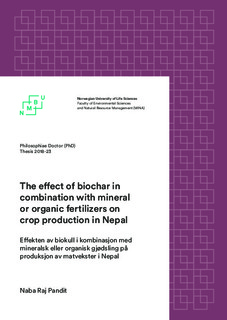| dc.contributor.advisor | Cornelissen, Gerard | |
| dc.contributor.advisor | Mulder, Jan | |
| dc.contributor.advisor | Hale, Sarah Elizabeth | |
| dc.contributor.advisor | Neupane, Ramji | |
| dc.contributor.author | Pandit, Naba Raj | |
| dc.coverage.spatial | Nepal | nb_NO |
| dc.date.accessioned | 2018-12-06T13:29:15Z | |
| dc.date.available | 2018-12-06T13:29:15Z | |
| dc.date.issued | 2018 | |
| dc.identifier.isbn | 978-82-575-1502-7 | |
| dc.identifier.issn | 1894-6402 | |
| dc.identifier.uri | http://hdl.handle.net/11250/2576435 | |
| dc.description.abstract | The majority of poor people in Nepal relies on agriculture for employment and livelihood sustenance. Declining soil fertility and ongoing climate change are the key challenges faced by farmers, with adverse effects on crop yield and food security. Population densities continue to increase and resources available for maintaining people’s livelihood are becoming increasingly scarce. Biochar is a carbon rich material produced by heating biomass in low oxygen environment known as pyrolysis. Biochar addition in soil has been reported to mitigate climate change and increase crop production per unit of land resulting in improved livelihoods in rural tropical settings.
Biochar can be produced from different organic feedstocks and by various kiln types. Some of the previous studies have used feedstock materials such as wood, palatable grass or shrubs and other crop residues that also can be used for other purposes. Such competition for biochar feedstock may threaten the sustainability of its implementation. Therefore, organic waste not used for other purposes or non-palatable weeds should be used for biochar production. Using invasive weeds for biochar would even turn a pest into a valuable resource. | nb_NO |
| dc.description.abstract | Flertallet av fattige mennesker i Nepal er avhengige av landbruk som inntekts- og matkilde. Synkende jordfruktbarhet og pågående klimaendringer er bøndenes hovedutfordringer, med negative effekter på avlinger og matsikkerhet. Befolkningstettheten øker stadig og ressursene som er tilgjengelige til å opprettholde folks levestandard blir stadig mindre. Biokull er et karbonrikt materiale som produseres ved forbrenning av biomasse uten tilgjengelig oksygen, såkalt pyrolyse. Biokulltilsetning i jord har blitt dokumentert å motvirke klimaendringene, samt øke avlingene per jordareal, noe som resulterer i bedre levestandard i landlige, tropiske omgivelser.
Biokull kan produseres fra forskjellige organiske råstoffer og med ulike pyrolysemetoder. I tidligere studier har det blitt brukt råmaterialer som trær, gress eller busker, samt annet jordbruksavfall som også kan brukes til andre formål. Konkurranse om biokullråmaterialet kan true bærekraftsperspektivet i implementeringen. Derfor bør organisk avfall som ikke brukes til andre formål, eller ikke-spiselige ugresstyper, brukes til produksjon av biokull. Ved å bruke introduserte ugressarter til biokullproduksjon, vill til og med en problematisk fremmedart kunne forvandles til en verdifull ressurs. | nb_NO |
| dc.description.sponsorship | The Research Council of Norway | nb_NO |
| dc.language.iso | eng | nb_NO |
| dc.publisher | Norwegian University of Life Sciences, Ås | nb_NO |
| dc.relation.ispartofseries | PhD Thesis;2018:23 | |
| dc.rights | Attribution-NonCommercial-NoDerivatives 4.0 Internasjonal | * |
| dc.rights.uri | http://creativecommons.org/licenses/by-nc-nd/4.0/deed.no | * |
| dc.subject | Biochar | nb_NO |
| dc.subject | Maize | nb_NO |
| dc.subject | Soil | nb_NO |
| dc.subject | Fertilizers | nb_NO |
| dc.subject | Nepal | nb_NO |
| dc.title | The effect of biochar in combination with mineral or organic fertilizers on crop production in Nepal | nb_NO |
| dc.title.alternative | Effekten av biokull i kombinasjon med mineralsk eller organisk gjødsling på produksjon av matvekster i Nepal | nb_NO |
| dc.type | Doctoral thesis | nb_NO |

